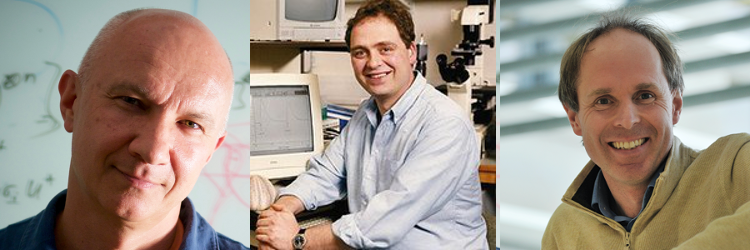
Image credit: Oxford University/Nasir Hamid
Seven Oxford academics elected Fellows of the Royal Society
The Royal Society has elected seven Oxford academics as new Fellows – more than any other university.
The Royal Society is a Fellowship of many of the world's most eminent scientists and is the oldest scientific academy in continuous existence. Fifty new Fellows and 10 new Foreign Members have been announced today.
The new Oxford Fellows:

Professor Steven Balbus is Savilian Professor of Astronomy and Head of Astrophysics at the University of Oxford. Steven Balbus is distinguished for studies of astrophysical fluids. He demonstrated that a seed magnetic field in a rotating, conducting fluid makes the flow turbulent, thus solving the old puzzle of how accretion discs work. He showed that when the magnetic Prandtl number is near unity, an accretion disc can enter a limit cycle in which periods of high and low viscosity alternate, as in compact X-ray sources. He showed that restriction of heat conduction to magnetic field lines creates buoyant instabilities. Using 'residual entropy' he gained insight into the Sun's convective zone and analytic fits to the results of helioseismology.
Professor Martin Bridson is Whitehead Professor of Pure Mathematics and Head of the Mathematical Institute at the University of Oxford. Martin Bridson has played a leading role in establishing Geometric Group Theory as a major field. He was an ICM Speaker (2006) and Abel Lecturer (2009). His monograph with Haefliger is the authoritative text on spaces of non-positive curvature. By developing numerous geometric techniques, Bridson provided deep insights into the nature of the word problem for finitely presented groups. Following his profound study of non-positive curvature in group theory, he solved (with Grunewald) Grothendieck's problems concerning profinite completions and representations of groups. He has proved remarkable structure theorems for residually-free groups.
Professor Bill David is Professor of Chemistry at the University of Oxford. Bill David is distinguished as a leader in the experimental, computational and theoretical development of neutron and X-ray powder diffraction techniques, and has made substantial contributions across a broad range of materials research from lithium batteries and high-temperature superconductors to fullerenes and pharmaceutical compounds. He has pioneered the field of time-of-flight neutron powder diffraction and is a key figure in establishing powder diffraction as a routine technique for the structure determination of molecular compounds. His materials research focuses on low-carbon chemical energy storage with the discovery of new hydrogen storage systems and the development of ammonia as an energy vector.
Professor Marcus du Sautoy is Simonyi Professor for the Public Understanding of Science and Professor of Mathematics at the University of Oxford. Marcus du Sautoy is distinguished both as one of science’s most successful ambassadors, communicating the importance, excitement and relevance of both mathematics and science to the general public, both in the UK and worldwide, and for his outstanding research straddling many different areas of mathematics: group theory, number theory, model theory, algebraic geometry. His public engagement work has involved best-selling books, extensive TV, radio and personal appearances worldwide, writing and acting in a mathematical play, children's literature, gaming and charitable work. Among other achievements, his research has completely transformed the study of zeta functions of groups, revealing hidden depths and unexpected applications.

Professor Artur Ekert is Professor of Quantum Physics at the Mathematical Institute, University of Oxford. Artur Ekert is one of the pioneers of quantum information science. His invention of entanglement-based quantum cryptography a quarter of a century ago triggered an explosion of research efforts worldwide and continues to inspire new research directions. As well as making the celebrated discovery that Bell's inequalities can be used to test for eavesdropping, he has contributed to many of the most important advances in the foundations and experimental realisations of quantum communication and computation. He has played a leading role in transforming the field of quantum information science from a niche academic activity into a vibrant interdisciplinary field.
Professor Antony Galione is Chair of Pharmacology and Head of the Department of Pharmacology at the University of Oxford. Antony Galione is distinguished for his pioneering work that has transformed our understanding of calcium signalling pathways. His innovative research has established the concept of multiple calcium mobilizing messengers, and identified their target channels and organelles. He established that cyclic ADP-ribose regulates calcium-induced calcium release and globalization of calcium signals, and that NAADP is a ubiquitous trigger for initiating and coordinating calcium signals. By developing novel pharmacological, molecular and physiological approaches, he has demonstrated that these novel messengers selectively control many fundamental cellular processes. His discovery of lysosomes as calcium stores mobilized by NAADP, has identified an entirely new signalling role for these organelles in health and disease.
Professor Gil McVean is Professor of Statistical Genetics and Director of the Big Data Institute, Li Ka Shing Centre for Health Information and Discovery at the University of Oxford. Gil McVean is distinguished for research into the nature and causes of molecular genetic variation. He developed a sophisticated, and now widely-used, statistical method for estimating fine-scale recombination rates from data documenting genetic variation. McVean produced the first fine-scale genetic maps of the human genome, and with collaborators identified a DNA sequence motif associated with hotspots (the first in any species) and the gene binding the motif. He has made substantial contributions to coalescent theory, and to our understanding of mutation and natural selection, and played a central role in the HapMap and 1,000 Genomes projects.
Professor Louise Richardson, Vice-Chancellor of the University of Oxford, said: 'Election to the Fellowship of the Royal Society is an honour awarded to the very best scientists in the country. To have seven Fellows elected from Oxford this year is a towering achievement and testament to the depth and range of the university's scientific and medical research. I know I speak for our entire community when I congratulate each of the new Fellows and take pride in this well deserved recognition.'
Venki Ramakrishnan, President of the Royal Society, said: 'Science is a way of understanding both the world around us and ourselves. It is one of the great triumphs of human achievement and has contributed hugely to our prosperity and health. Science will continue to play a crucial role as we tackle some of the great challenges of our time including food, energy, health and the environment. The scientists elected to the Fellowship are leaders who have advanced their fields through their ground breaking work. We are delighted to welcome them to the Royal Society.'
The Fellowship of the Royal Society is made up of the most eminent scientists, engineers and technologists from or living and working in the UK and the Commonwealth. Past Fellows and Foreign Members have included Isaac Newton, Charles Darwin, Albert Einstein and Stephen Hawking.
 New research reveals shared genetic link between endometriosis and immune conditions
New research reveals shared genetic link between endometriosis and immune conditions
 Learning centre celebrates 10 years working with young people in Oxford
Learning centre celebrates 10 years working with young people in Oxford
 Expert Comment: The point of the pope. Why His Holiness matters (even if you’re not a Catholic)
Expert Comment: The point of the pope. Why His Holiness matters (even if you’re not a Catholic)
 Child heart disease found to be more likely if mother has anaemia during pregnancy
Child heart disease found to be more likely if mother has anaemia during pregnancy